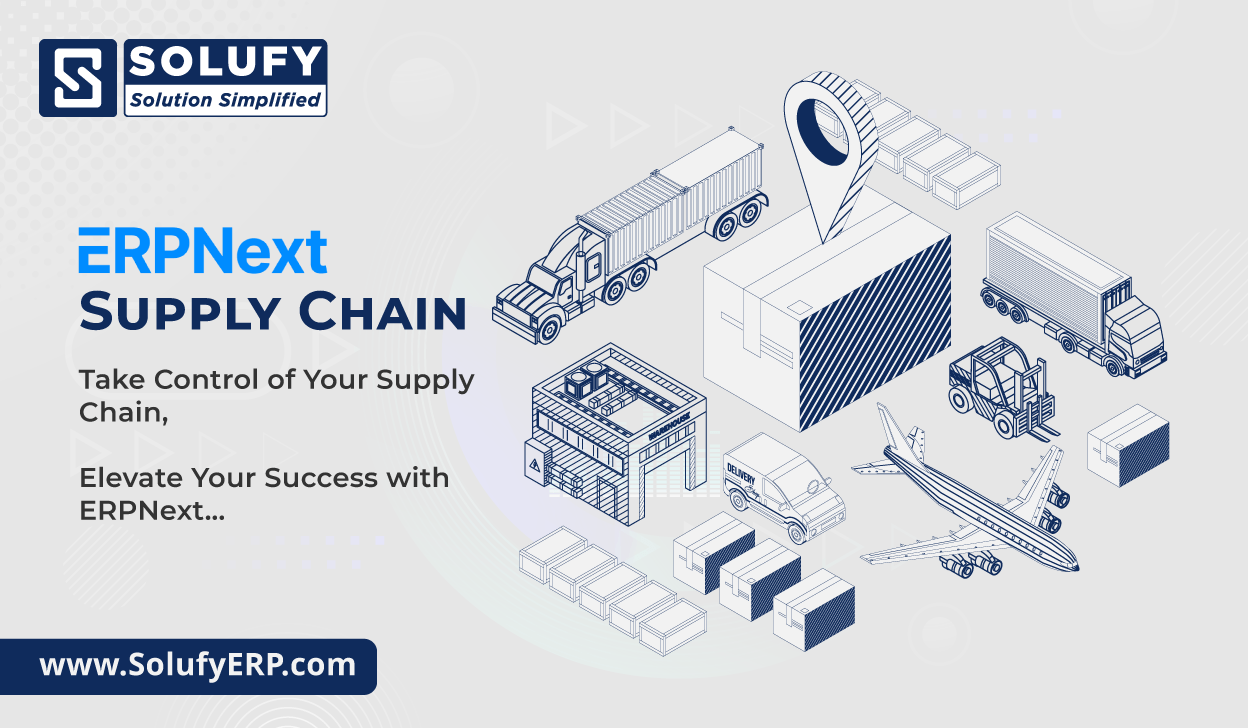Introduction:
In today’s dynamic business landscape, efficient Supply Chain Management is crucial for the success of any organisation. Companies are consistently searching for innovative solutions to streamline their operations and enhance overall productivity. One similar solution that has gained significant traction is ERPNext, a comprehensive Enterprise Resource Planning (ERP) system. In this blog, we will explore how ERPNext is revolutionising the supply chain industry, focusing on the features and benefits highlighted by Solufy ERP, a leading provider of ERP solutions.
I. Understanding the Supply Chain Challenges:
The supply chain industry faces various challenges, such as complex processes, inventory management issues, and the need for real-time visibility. Traditional methods often fall short of addressing these challenges effectively. ERPNext emerges as a trans-formative force by providing a consolidated platform that seamlessly integrates and automates crucial functions within the supply chain.
II. Streamlining Processes with ERPNext:
Solufy ERP emphasises the role of ERPNext in streamlining supply chain processes. The system offers modules Committed to inventory management, order processing, procurement, and logistics. By centralizing these functions, businesses can achieve greater efficiency and accuracy in their operations. Real-time data updates enable better decision-making, reducing the risk of errors and delays.
III. Enhanced Visibility and Control:
One of the main advantages of ERPNext highlighted by Solufy ERP is its ability to provide enhanced visibility and control over the entire supply chain. From supplier management to order fulfilment, businesses can track and monitor every step of the process. This visibility ensures that organisations/Businesses can proactively address issues, optimise workflows, and make informed strategic decisions.
IV. Inventory Optimisation:
Managing inventory is a crucial aspect of supply chain management. ERPNext facilitates inventory optimisation by offering features such as demand forecasting, real-time stock tracking, and automated reorder points. We emphasise how these features help businesses minimise excess inventory, reduce carrying costs, and ensure timely order fulfilment.
V. Collaboration and Communication:
Effective collaboration and communication are vital in a supply chain ecosystem involving multiple stakeholders. ERPNext enables seamless communication and collaboration between various departments, suppliers, and distributors. We emphasise how this collaboration fosters a more responsive and agile supply chain, better equipped to adapt to changing market conditions.
VI. Scalability and Customisation:
As businesses grow and evolve, their supply chain requirements change. Solufy ERP points out that ERPNext is highly scalable and customisation, allowing organisations to tailor the system to their specialisation needs. Whether expanding operations, entering new markets, or diversifying product lines, ERPNext can adapt to the evolving demands of the supply chain.
Conclusion:
In conclusion, ERPNext emerges as a powerful solution for addressing the challenges faced by the supply chain industry. Solufy ERP’s insights shed light on how ERPNext streamlines processes, enhances visibility, optimises inventory, fosters collaboration, and offers scalability. As organisations continue to prioritise efficiency and agility in their supply chain operations, ERPNext stands out as a comprehensive and flexible ERP system that can drive trans-formative change in the industry.
Know More : https://www.solufyerp.com/industries/supplychain-erp-management-software/

